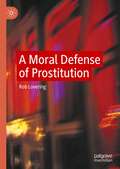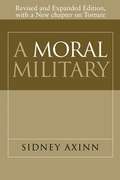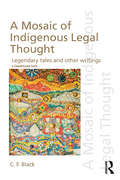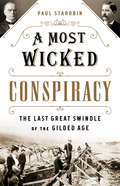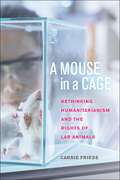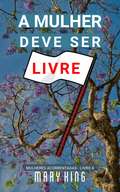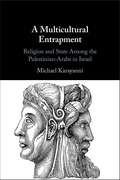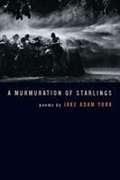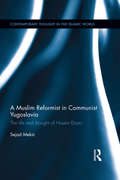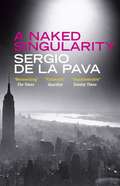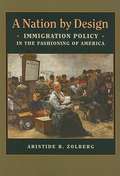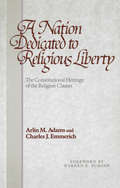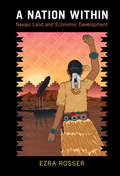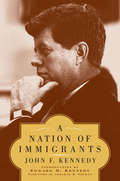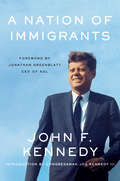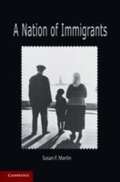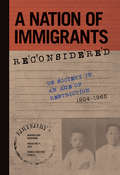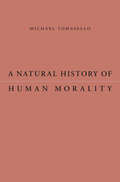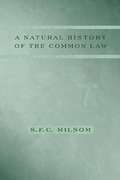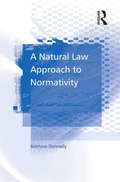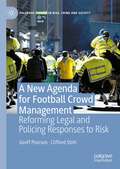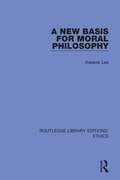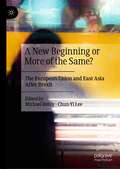- Table View
- List View
A Moral Defense of Prostitution
by Rob LoveringIs prostitution immoral? In this book, Rob Lovering argues that it is not. Offering a careful and thorough critique of the many—twenty, to be exact—arguments for prostitution's immorality, Lovering leaves no claim unchallenged. Drawing on the relevant literature along with his own creative thinking, Lovering offers a clear and reasoned moral defense of the world's oldest profession. Lovering demonstrates convincingly, on both consequentialist and nonconsequentialist grounds, that there is nothing immoral about prostitution between consenting adults. The legal implications of this view are also brought to bear on the current discourse surrounding this controversial topic.
A Moral Military, Revised and Expanded Edition
by Sidney AxinnShould a good soldier ever disobey a direct military order? Are there restrictions on how we fight a war? What is meant by 'military honor', and does it really affect the contemporary soldier? Is human dignity possible under battlefield conditions? Sidney Axinn considers these basic ethical questions within the context of the laws of warfare and answers 'yes' to each of these questions. In this study of the conduct of war, he examines actions that are honorable or dishonorable and provides the first full-length treatment of the military conventions from a philosophical point of view. Axinn gives a philosophical analysis of the 'Laws of Warfare' as found in the Hague and Geneva Conventions, which have been agreed to by almost every nation in the world. The aims of his study are to establish a basic twentieth-century framework for moral military action and to assist military personnel in analyzing their won professional ethic.Stating that moral reasoning is required by people in military uniform in a wide variety of situations, the author examines the question of the limits of military obedience. Axinn argues for the seriousness of the concept of military honor but limits honorable military activity by a strict interpretation of the notion of war crime. Major chapters deal with military honor, prisoners of war, spying, war crimes, the dirty-hands theory of command, nuclear weapons, terrorism, and covert operations. This philosophical study of the line between honorable and dishonorable military action cautions that in compliance with the war conventions professional military personnel and knowledgeable civilians must not lose their moral nerve nor abandon honor to satisfy immoral political requests. Author note: Sidney Axinn is Professor of Philosophy at Temple University.
A Mosaic of Indigenous Legal Thought: Legendary Tales and Other Writings
by C.F. BlackThis book offers an Indigenous supplement to the rich and growing area of visual legal scholarship. Organized around three narratives, each with an associated politico-poetic reading, the book addresses three major global issues: climate change, the trade in human body parts and bio-policing. Manifesting and engaging the traditional storytelling mode of classical Indigenous ontology, these narratives convey legal and political knowledge, not merely through logical argument, but rather through the feelings of law and the understanding of lawful behaviour produced by their rhythm. Through its own performativity, therefore, the book demonstrates how classical Indigenous legal traditions remain vital to the now pressing challenge of making peace with the earth.
A Most Wicked Conspiracy: The Last Great Swindle of the Gilded Age
by Paul StarobinA tale of Gilded Age corruption and greed from the frontier of Alaska to America's capital.In the feverish, money-making age of railroad barons, political machines, and gold rushes, corruption was the rule, not the exception. Yet the Republican mogul "Big Alex" McKenzie defied even the era's standard for avarice. Charismatic and shameless, he arrived in the new Alaskan territory intent on controlling gold mines and draining them of their ore. Miners who had rushed to the frozen tundra to strike gold were appalled at his unabashed deviousness.A Most Wicked Conspiracy recounts McKenzie's plot to rob the gold fields. It's a story of how America's political and economic life was in the grip of domineering, self-dealing, seemingly-untouchable party bosses in cahoots with robber barons, Senators and even Presidents. Yet it is also the tale of a righteous resistance of working-class miners, muckraking journalists, and courageous judges who fought to expose a conspiracy and reassert the rule of law.Through a bold set of characters and a captivating narrative, Paul Starobin examines power and rampant corruption during a pivotal time in America, drawing undoubted parallels with present-day politics and society.
A Mother's Touch: The Tiffany Callo Story
by Jay MathewsThe author, a journalist, retraces the life of Tiffany Callo and her battle to regain custody of her two children. Tiffany, a teenage mother living on public assistence, was deemed an unfit mother by the children's services of Santa Clara County, CA. Her disability - cerebral palsy - was used as a major strike against her. Callo's case aroused wide publicity and helped arouse interest in the rights and concerns of parents with disabilities.
A Mouse in a Cage: Rethinking Humanitarianism and the Rights of Lab Animals
by Carrie FrieseQuestions the treatment of laboratory animals in biomedical researchLaboratory animals are often used to develop medical treatments: vaccines, antibiotics, and organ transplants have all relied upon animal testing to ensure safety and success for human benefit. Yet the relationship between the scientific community's dependence on laboratory animals and the recognition of the need to treat these animals with respect and compassion has given rise to a profound tension.As animals are increasingly understood to have rights and autonomy, Carrie Friese posits that, while care and compassion for a distant other who suffers are central to humanitarianism, the idea of a distant other itself, which has shaped work with laboratory animals both historically and today, has enacted forms of highly problematic paternalism, creating a double bind. Focusing on the lives of laboratory mice and rats in the United Kingdom, and on the people who take care of, and often kill, these animals, Friese gives the name of “more-than-human humanitarianism” to contradictory practices of suffering and compassion, killing and sacrifice, and compassion and consent that she witnessed in a variety of animal facilities and laboratories.Friese proposes a new approach to the treatment of laboratory animals that recognizes the interconnectedness of all species and how human actions impact the welfare of other species and the planet as a whole. A Mouse in a Cage is an essential contribution to the ongoing conversation about the ethical treatment of animals.
A Mulher Deve Ser Livre: Em Defesa das Mulheres (Mulheres Acorrentadas - Livro 4 #4)
by Mary KingEm um mundo no qual ela acredita que homens e mulheres não têm direitos iguais perante a lei, dias de liberdade de Emelisa estão contados. Como defesa, Emelisa deve confiar no advogado de defesa Humphrey, um ativista dos direitos humanos e membro de longa data de uma organização poderosa, Salve as Mulheres Negras.
A Multicultural Entrapment: Religion and State Among the Palestinian-Arabs in Israel
by Michael KarayanniThe religion and state debate in Israel has overlooked the Palestinian-Arab religious communities and their members, focusing almost exclusively on Jewish religious institutions and norms and Jewish majority members. Because religion and state debates in many other countries are defined largely by minority religions' issues, the debate in Israel is anomalous. Michael Karayanni advances a legal matrix that explains this anomaly by referencing specific constitutional values. At the same time, he also takes a critical look at these values and presents the argument that what might be seen as liberal and multicultural is at its core just as illiberal and coercive. In making this argument, A Multicultural Entrapment suggests a set of multicultural qualifications by which one should judge whether a group based accommodation is of a multicultural nature.
A Murmuration of Starlings
by Jake Adam YorkThis book elegizes the martyrs of the civil rights movement, whose names are inscribed on the stone table of the Civil Rights Memorial in Montgomery, Alabama. <P><P> Individually, Jake Adam York’s poems are elegies for individuals; collectively, they consider the violence of a racist culture and the determination to resist that racism. York follows Sun Ra, a Birmingham jazz musician whose response to racial violence was to secede from planet Earth, considers the testimony in the trial of J. W. Milam and Roy Bryant for the murder of Emmet Till in 1955, and recreates events of Selma, Alabama, in 1965. Throughout the collection, an invasion of starlings images the racial hatred and bloodshed. <P><P>While the 1950s spawned violence, the movement in the early 1960s transformed the language of brutality and turned the violence against the violent, says York. So, the starlings, first produced by violence, become instruments of resistance. York’s collection responds to and participates in recent movements to find and punish the perpetrators of the crimes that defined the civil rights movement. This book participates in the search for justice, satisfaction, and closure.
A Muslim Reformist in Communist Yugoslavia: The Life and Thought of Husein Đozo (Contemporary Thought in the Islamic World)
by Sejad MekićA Muslim Reformist in Communist Yugoslavia examines the Islamic modernist thought of Husein Đozo, a prominent Balkan scholar. Born at a time when the external challenges to the Muslim world were many, and its internal problems both complex and overwhelming, Đozo made it his goal to reinterpret the teachings of the Qur’an and hadīth (prophetic tradition) to a generation for whom the truths and realities of Islam had fallen into disuse. As a Muslim scholar who lived and worked in a European, communist, multi-cultural and multi-religious society, Husein Đozo and his work present us with a particularly exciting account through which to examine the innovative interpretations of Islam. <p><P>For example, through a critical analysis of Đozo’s most significant fatwās and other relevant materials, this book examines the extent of the inherent flexibility of the Islamic law and its ability to respond to Muslim interests in different socio-political conditions. Since Đozo’s writings in general and his fatwās in particular have continued to be published in the Balkan lands up to the present, this monograph should help shed some light on certain assumptions underlying modern Islamic thought and consciousness found in the region.
A Naked Singularity
by Sergio De La PavaNOW A MAJOR FILM STARRING JOHN BOYEGA, OLIVIA COOKE AND BILL SKARSGÅRD"The Wire written by Voltaire" Sunday Times"Crime and Punishment as reimagined by the Coen Brothers" The MillionsCasi is a hotshot public defender working on the front line of America's War on Drugs. So far he's on the winning side. He's never lost a case. But nothing lasts forever, and pride like his has a long way to fall. Funny, smart and always surprising, A Naked Singularity speaks a language all of its own and reads like nothing else ever written. Casi's beautiful mind and planetary intelligence make him an inimitable and unforgettable narrator. In De La Pava's hands, the labyrinthine miseries of the New York Justice System are as layered and diabolical as Dante's nine circles of Hell. But the Devil doesn't hog the best lines. There are plenty here to go around.
A Naked Singularity: A Novel
by Sergio de la Pava“Propulsive . . . The novel’s chaotic sprawl, black humor and madcap digressions make it a thrilling rejoinder to the tidy story arcs [of] most crime fiction.” —The Wall Street JournalWinner of the PEN/Robert W. Bingham Prize for Best Debut NovelNamed a Best Book of the Year in the Wall Street Journal, Houston Chronicle, and Philadelphia City PaperA Naked Singularity tells the story of Casi, born to Colombian immigrants, who lives in Brooklyn and works in Manhattan as a public defender—one who, tellingly, has never lost a trial. Never. In the book, we watch what happens when his sense of justice and even his sense of self begin to crack—and how his world then slowly devolves. A huge, ambitious novel in the vein of DeLillo, Foster Wallace, Pynchon, and even Melville, it’s told in a distinct, frequently hilarious voice, with a striking human empathy at its center. Its panoramic reach takes readers through crime and courts, immigrant families and urban blight, media savagery and media satire, scatology and boxing, and even a breathless heist worthy of any crime novel. If Infinite Jest stuck a pin in the map of mid-90s culture and drew our trajectory from there, A Naked Singularity does the same for the feeling of surfeit, brokenness, and exhaustion that permeates our civic and cultural life today. In the opening sentence of William Gaddis’s A Frolic of His Own, a character sneers, “Justice? You get justice in the next world. In this world, you get the law.” A Naked Singularity reveals the extent of that gap, and lands firmly on the side of those who are forever getting the law.“A great American novel.” —Toronto Star
A Nation By Design: Immigration Policy In The Fashioning Of America
by Aristide R. ZolbergAccording to the national mythology, the United States has long opened its doors to people from across the globe, providing a port in a storm and opportunity for any who seek it. Yet the history of immigration to the United States is far different. Even before the xenophobic reaction against European and Asian immigrants in the late nineteenth century, social and economic interest groups worked to manipulate immigration policy to serve their needs. In A Nation by Design, Aristide Zolberg explores American immigration policy from the colonial period to the present, discussing how it has been used as a tool of nation building. <p><p> A Nation by Design argues that the engineering of immigration policy has been prevalent since early American history. However, it has gone largely unnoticed since it took place primarily on the local and state levels, owing to constitutional limits on federal power during the slavery era. Zolberg profiles the vacillating currents of opinion on immigration throughout American history, examining separately the roles played by business interests, labor unions, ethnic lobbies, and nativist ideologues in shaping policy. He then examines how three different types of migration--legal migration, illegal migration to fill low-wage jobs, and asylum-seeking--are shaping contemporary arguments over immigration to the United States. <p> A Nation by Design is a thorough, authoritative account of American immigration history and the political and social factors that brought it about. With rich detail and impeccable scholarship, Zolberg's book shows how America has struggled to shape the immigration process to construct the kind of population it desires.
A Nation Dedicated to Religious Liberty
by Arlin M. Adams Warren E. Burger Charles J. EmmerichHere is a concise overview of the historical development and judicial interpretation of the First Amendment religion clauses. It begins with a survey of the history of American religious liberty, goes on to present the views of the Founding Fathers, and then considers the core value of religious liberty and the constitutional purposes that implement that value.the book ends on a practical note by applying these principles to questions of equal access, religious symbolism in public life, and the task of defining religion for constitutional purposes. As the authors note in their introduction, "the historical principles that animate the religion clauses are more than an abstract intellectual exercise. . . . They provide an essential context for guiding the resolution of modern religious liberty issues."
A Nation Within: Navajo Land and Economic Development
by Ezra RosserIn A Nation Within, Ezra Rosser explores the connection between land-use patterns and development in the Navajo Nation. Roughly the size of Ireland or West Virginia, the Navajo reservation has seen successive waves of natural resource-based development over the last century: grazing and over-grazing, oil and gas, uranium, and coal; yet Navajos continue to suffer from high levels of unemployment and poverty. Rosser shows the connection between the exploitation of these resources and the growth of the tribal government before turning to contemporary land use and development challenges. He argues that, in addition to the political challenges associated with any significant change, external pressures and internal corruption have made it difficult for the tribe to implement land reforms that could help provide space for economic development that would benefit the Navajo Nation and Navajo tribal members.
A Nation of Immigrants
by John F. KennedyThroughout his presidency, John F. Kennedy was passionate about the issue of immigration reform. He believed that America is a nation of people who value both tradition and the exploration of new frontiers, people who deserve the freedom to build better lives for themselves in their adopted homeland. This modern edition of his posthumously published, timeless work—with a new introduction by Senator Edward M. Kennedy and a foreword by Abraham H. Foxman, national director of the Anti-Defamation League—offers the late president's inspiring suggestions for immigration policy and presents a chronology of the main events in the history of immigration in America.As continued debates on immigration engulf the nation, this paean to the importance of immigrants to our nation's prominence and success is as timely as ever.
A Nation of Immigrants
by John F. Kennedy“In this timeless book, President Kennedy shows how the United States has always been enriched by the steady flow of men, women, and families to our shores. It is a reminder that America’s best leaders have embraced, not feared, the diversity which makes America great.” —Former Secretary of State Madeleine K. Albright Throughout his presidency, John F. Kennedy was passionate about the issue of immigration reform. He believed that America is a nation of people who value both tradition and the exploration of new frontiers, deserving the freedom to build better lives for themselves in their adopted homeland. This 60th anniversary edition of his posthumously published, timeless work—with a foreword by Jonathan Greenblatt, the National Director and CEO of the ADL, formerly known as the Anti-Defamation League, and an introduction from Congressman Joe Kennedy III—offers President Kennedy’s inspiring words and observations on the diversity of America’s origins and the influence of immigrants on the foundation of the United States.The debate on immigration persists. Complete with updated resources on current policy, this new edition of A Nation of Immigrants emphasizes the importance of the collective thought and contributions to the prominence and success of the country.
A Nation of Immigrants
by Susan F. MartinImmigration makes America what it is and is formative for what it will become. America was settled by three different models of immigration, all of which persist to the present. The Virginia Colony largely equated immigration with the arrival of laborers, who had few rights. Massachusetts welcomed those who shared the religious views of the founders but excluded those whose beliefs challenged the prevailing orthodoxy. Pennsylvania valued pluralism, becoming the most diverse colony in religion, language, and culture. This book traces the evolution of these three models of immigration as they explain the historical roots of current policy debates and options. Arguing that the Pennsylvania model has best served the country, the final chapter makes recommendations for future immigration reform. Given the highly controversial nature of immigration in the United States, this book provides thoughtful analysis, valuable to both academic and policy audiences.
A Nation of Immigrants Reconsidered: US Society in an Age of Restriction, 1924-1965 (Studies of World Migrations #21)
by Maddalena Marinari Madeline Hsu Maria Cristina GarciaScholars, journalists, and policymakers have long argued that the 1965 Immigration and Nationality Act dramatically reshaped the demographic composition of the United States. In A Nation of Immigrants Reconsidered, leading scholars of immigration explore how the political and ideological struggles of the so-called "age of restriction"--from 1924 to 1965--paved the way for the changes to come. The essays examine how geopolitics, civil rights, perceptions of America's role as a humanitarian sanctuary, and economic priorities led government officials to facilitate the entrance of specific immigrant groups, thereby establishing the legal precedents for future policies. Eye-opening articles discuss Japanese war brides and changing views of miscegenation, the recruitment of former Nazi scientists, a temporary workers program with Japanese immigrants, the emotional separation of Mexican immigrant families, Puerto Rican youth's efforts to claim an American identity, and the restaurant raids of conscripted Chinese sailors during World War II. Contributors: Eiichiro Azuma, David Cook-Martín, David FitzGerald, Monique Laney, Heather Lee, Kathleen López, Laura Madokoro, Ronald L. Mize, Arissa H. Oh, Ana Elizabeth Rosas, Lorrin Thomas, Ruth Ellen Wasem, and Elliott Young.
A Natural History of Human Morality
by Michael TomaselloMichael Tomasello offers the most detailed account to date of the evolution of human moral psychology. Based on experimental data comparing great apes and human children, he reconstructs two key evolutionary steps whereby early humans gradually became an ultra-cooperative and, eventually, a moral species capable of acting as a plural agent "we".
A Natural History of the Common Law (James S. Carpentier Lectures)
by S. F. MilsomHow does law come to be stated as substantive rules, and then how does it change? In this collection of discussions from the James S. Carpentier Lectures in legal history and criticism, one of Britain's most acclaimed legal historians S. F. C. Milsom focuses on the development of English common law—the intellectually coherent system of substantive rules that courts bring to bear on the particular facts of individual cases—from which American law was to grow. Milsom discusses the differences between the development of land law and that of other kinds of law and, in the latter case, how procedural changes allowed substantive rules first to be stated and then to be circumvented. He examines the invisibility of early legal change and how adjustment to conditions was hidden behind such things as the changing meaning of words. Milsom points out that legal history may be more prone than other kinds of history to serious anachronism. Nobody ever states his assumptions, and a legal writer, addressing his contemporaries, never provided a glossary to warn future historians against attributing their own meanings to his words and therefore their own assumptions to his world. Formal continuity has enabled nineteenth-century assumptions to be carried back, in some respects as far back as the twelfth century. This book brings together Milsom's efforts to understand the uncomfortable changes that lie beneath that comforting formal surface. Those changes were too large to have been intended by anyone at the time and too slow to be perceived by historians working within the short periods now imposed by historical convention. The law was made not by great men making great decisions but by man-sized men unconcerned with the future and thinking only about their own immediate everyday difficulties. King Henry II, for example, did not intend the changes attributed to him in either land law or criminal law; the draftsman of De Donis did not mean to create the entail; nobody ever dreamed up a fiction with intent to change the law.
A Natural Law Approach to Normativity
by Bebhinn DonnellyExploring the relationship between natural law theory and the philosophy of law, Bebhinn Donnelly proposes a new approach to natural law theory - one which addresses some of the tradition's shortcomings and advances further its approach to Hume's dichotomy. Key features: ¢ Provides a clear definition of `nature' in this context ¢ Contrasts the work of Hume and Kant regarding the `is/ought' issue ¢ Examines the approach in traditional natural law ¢ Presents a full discussion of Finnis and the departure from traditional natural law ¢ Proposes a new, natural law approach to normativity, drawing on the strengths of traditional natural law theory ¢ Illustrates how natural law may provide a normative base for law A Natural Law Approach to Normativity presents an original perspective on natural law theory and will be of interest to academics in philosophy of law, moral/political philosophy, natural law theorists, and students of jurisprudence internationally.
A New Agenda For Football Crowd Management: Reforming Legal and Policing Responses to Risk (Palgrave Studies in Risk, Crime and Society)
by Geoff Pearson Clifford StottThis book provides a holistic and interdisciplinary focus on the legal regulation and policing of football violence and disorder in Britain. Anchored in ground-breaking ethnographic and participant-action research, the book combines a crowd psychology and socio-legal approach to critically explore the contemporary challenges of managing football crowds. It sets out the processes by which football disorder occurs and the limitations of existing approaches to policing ‘football hooliganism’, in particular the dominant focus on controlling ‘risk supporters’, before setting out proposals for fundamental reforms to both law and policing. This book will be of value to academics, students, legal and policing practitioners, as well as policy-makers. The two authors are internationally known experts in the management and behaviour of football crowds and bring together for the first time over 30 years of research in this area from the disciplines of law and social psychology.
A New Basis for Moral Philosophy
by Keekok LeeOriginally published in 1985, this book establishes that moral discourse is critical, rational and objective and challenges the ideology of value irrationalism behind contemporary liberalism. The book discusses the origins of the fact/value distinction, and calls into question the thesis that logical derivability or strict implication is the only legitimate relationship between propositions. A straightforward philosophical treatment of the subject, in the analytical tradition, it will be especially useful for undergraduate students.
A New Beginning or More of the Same?: The European Union and East Asia After Brexit
by Michael Reilly Chun-Yi LeeThe EU’s interest in and engagement with North East Asia has grown massively over the last three decades, the shaping and implementation of its policy influenced heavily by the UK and its historical links with East Asia. Brexit therefore raises questions about the future of this engagement and comes against a background of wider threats to the liberal world order, especially rising tensions between the USA and China. Worried that they may be forced to choose sides in their hitherto carefully managed relationships with the two, China’s neighbours are therefore watching with interest to see how the EU and the UK respond and manage their future relations with the region. This book goes beyond the traditional trade links to consider diplomatic and security perspectives, as well as wider issues such as the possible impact on educational and research links. It will be of interest to diplomats, scholars, and economists.
